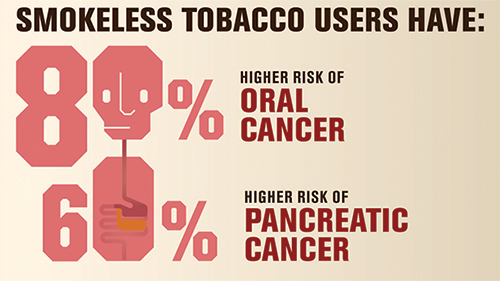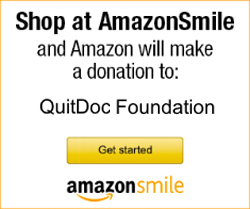News and Events
Quitting Smokeless Tobacco is More Important Than Ever This Through With Chew Week!
February 15, 2021
Sebring, Fla. – Each year, Through With Chew Week raises awareness about the dangers of smokeless tobacco use (chew, dip and snus) and the effective tools available to quit. This Through With Chew Week, Feb. 21-27, Highlands County is encouraging smokeless tobacco users to set a quit date and use Tobacco Free Florida’s free and proven-effective resources to quit for good.
In light of the COVID-19 pandemic, quitting smokeless tobacco is more important than ever. Smokeless tobacco is harmful to health and highly addictive(1). The use of some types of smokeless tobacco products is associated with an increased risk of heart disease and stroke(2,3) and having heart disease increases your risk of severe illness from COVID-19(4). Smokeless tobacco also contains harmful chemicals, such as a radioactive element called polonium-210 and harmful metals including arsenic and lead. Some of these chemicals are known to cause cancer(5). Apart from cancer, other oral health issues from smokeless tobacco include mouth sores, gum recession, tooth decay, and permanent discoloration of teeth(6).

“Smokeless tobacco poses serious health risks, especially during the COVID-19 pandemic,” said Amanda John, Community Health Advocate with QuitDoc Foundation, “We want residents in our area to know that Tobacco Free Florida has free tools and services to help them improve their overall health and quit tobacco.”
This year the SWAT (Students Working Against Tobacco) Chapter and the Tobacco Free Partnership of Highlands County will be celebrating Through With Chew Week during the week of the Highlands County Fair, from February 12-20th. There will be informational handouts encouraging all smokeless tobacco users to quit and will have informational displays that show the effects of using smokeless tobacco.
Those looking to quit tobacco can create a personalized quit plan using Tobacco Free Florida’s free Quit Your Way tools and services. The Quit Your Way program offers free tools and services like Phone Quit, Group Quit and Web Quit, in addition to individual tools like text support, a Quit Guide and helpful emails. Free nicotine replacement therapy – nicotine patches, gum or lozenges – are available to tobacco users who are 18 or older, if medically appropriate.
For more information on quitting tobacco, you can call 1-877-U-CAN-NOW (1-877-822-6669) or visit tobaccofreeflorida.com/quityourway.
About Tobacco Free Florida
The Florida Department of Health’s Tobacco Free Florida campaign is a statewide cessation and prevention campaign funded by Florida’s tobacco settlement fund. Since the program began in 2007, more than 254,000 Floridians have successfully quit using one of Tobacco Free Florida's free tools and services. There are now approximately 451,000 fewer adult smokers in Florida than there was 10 years ago, and the state has saved $17.7 billion in health care costs(7). To learn more about Tobacco Free Florida’s Quit Your Way services, visit www.tobaccofreeflorida.com or follow the campaign on Facebook at www.facebook.com/TobaccoFreeFlorida or on Twitter at www.twitter.com/tobaccofreefla.
________________________________________________________________
References:
- American Lung Association. Cutting Tobacco’s Rural Roots: Tobacco Use in Rural Communities. Chicago: American Lung Association, 2015 [Accessed October 6, 2020].
- National Cancer Institute and Centers for Disease Control and Prevention. Smokeless Tobacco and Public Health: A Global Perspective. Bethesda, MD: U.S. Department of Health and Human Services, Centers for Disease Control and Prevention and National Institutes of Health, National Cancer Institute. NIH Publication No. 14-7983; 2014. [Accessed October 6, 2020]
- Piano MR, Benowitz NL, Fitzgerald GA, Corbridge S, Heath J, Hahn E, et al. Impact of Smokeless Tobacco Products on Cardiovascular Disease: Implications for Policy, Prevention, and Treatment: A Policy Statement from the American Heart Association. Circulation 2010;122(15):1520–44 [Accessed October 6, 2020]
- Centers for Disease Control and Prevention. “People at Risk for Serious Illness from COVID-19.” Centers for Disease Control and Prevention, 10 Mar. 2020, www.cdc.gov/coronavirus/2019-ncov/specific-groups/high-riskcomplications.html. Accessed October 19, 2020.
- Stanfill SB, Connolly GN, Zhang L, Jia LT, Henningfield JE, Richter P, et al. Global Surveillance of Oral Tobacco Products: Total Nicotine, Unionised Nicotine and Tobacco-Specific N-Nitrosamines. Tobacco Control 2011 May;20(3):e2. doi:10.1136/tc.2010.037465. [Accessed October 12, 2020]
- Tomar, SL. “Chewing Tobacco Use and Dental Caries Among U.S. Men,” Journal of the American Dental Association, 1999, 130: 160.
- Mann, Nathan M, Nonnemaker, James M., Thompson, Jesse. "Smoking-Attributable Health Care Costs in Florida and Potential Health Care Cost Savings Associated with Reductions in Adult Smoking Prevalence." 2016.




